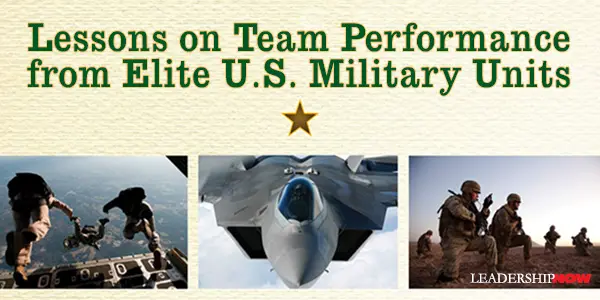 |
 |
03.11.14

Lessons on Team Performance from Elite U.S. Military Units
JAMES MURPHY says American business has an execution problem. Why? Because we make things complex. “Complexity is the mortal enemy of good execution.” We tend to combat complexity with even more complexity. Simplicity is the SEALs answer to a complex world. In Courage to Execute, Murphy walks us through a simple process used by America’s elite military units that will improve an organization’s ability to execute and achieve goals. “Their courage, confidence, and capabilities stem from a relentless, time-proven process of conditioning, training, planning, executing, and improving.”Soldiers morph into Rangers—individuals into teams—when they get a sense of who they are and what they’re a part of. “Together, the army’s core values and the Ranger Creed create a unique organizational identity that breeds unit and trust. This is the glue that holds everything together.” Successful organizations are able to focus and execute according to purpose. “Principles are like cardinal rules so important to your organization that they should never be broken. They are things you always do or never do. They are your guardrails.” To align everyone in your organization create and pursue a common high definition destination. “Think exclusively in high definition and create a specific, detailed, granular, crystal-clear picture of what you’ll look like and how you’ll be operating when your organization reaches its intended future destination.” Keep in mind, “General ideas lead to general execution, and that gets sloppy.” When you plan your “mission” ask, is it clear? Is it measurable? Is it achievable? Does it align with your high definition destination? Every plan should be run by a red-team. “Red teams play the role of adversary.” They “identify potential risks, holes, or contingencies that the original group may have overlooked.” Once you begin to execute, “never let yourself or your team lose sight of where you are relative to your objective and your threats.” Utilize checklists and cross-checks to help avoid task saturation. The moment you have too much to do or resources to do it, you lose focus on the most important thing. “When people become task saturated, they either quit, compartmentalize, or channel. In each case, their performance deteriorates rapidly. Quitters stop working or stop being productive. Those who compartmentalize appear busy but focus on tasks that accomplish little. Most of us, however, channel our focus onto one thing and ignore the rest. None of these behaviors lead to a good outcome.” Murphy says debriefing is the essence of teamwork. “Organizations that don’t debrief often equate failure with retribution or negative consequences.” (And often for good reason.) But it is an opportunity to improve and to see if something systemic might have caused the problem. Murphy advocates the STEALTH debrief: Set the time, Tone, Execution versus objectives, Analyze execution, Lessons learned, Transfer lessons learned, and end on a High note. 
Posted by Michael McKinney at 09:30 PM
|
BUILD YOUR KNOWLEDGE
 

How to Do Your Start-Up Right STRAIGHT TALK FOR START-UPS 
Grow Your Leadership Skills NEW AND UPCOMING LEADERSHIP BOOKS 
Leadership Minute BITE-SIZE CONCEPTS YOU CAN CHEW ON 
Classic Leadership Books BOOKS TO READ BEFORE YOU LEAD |